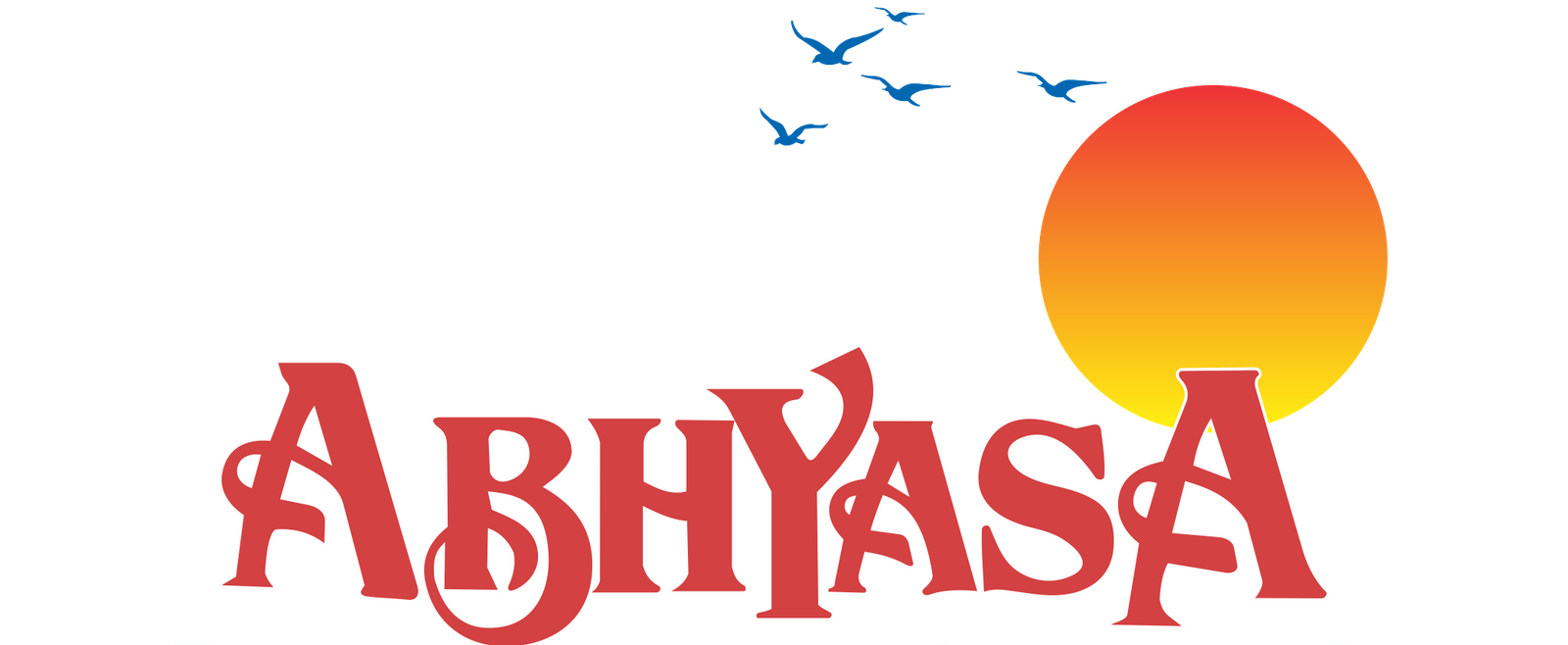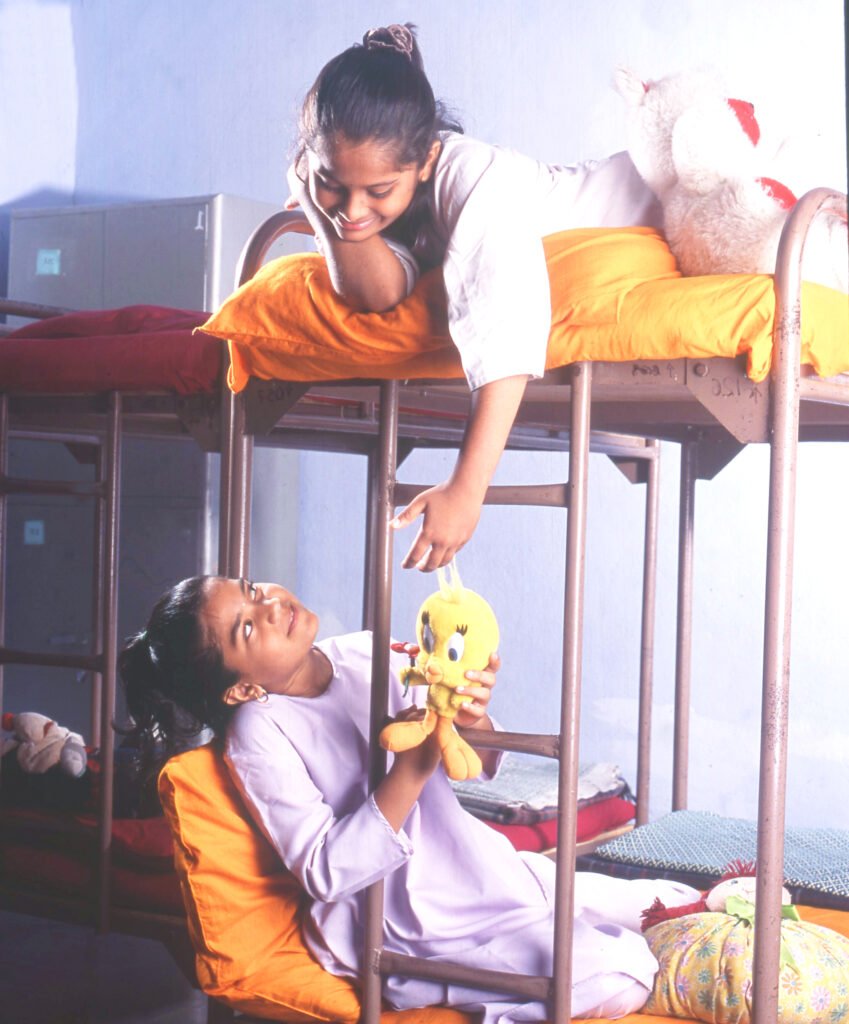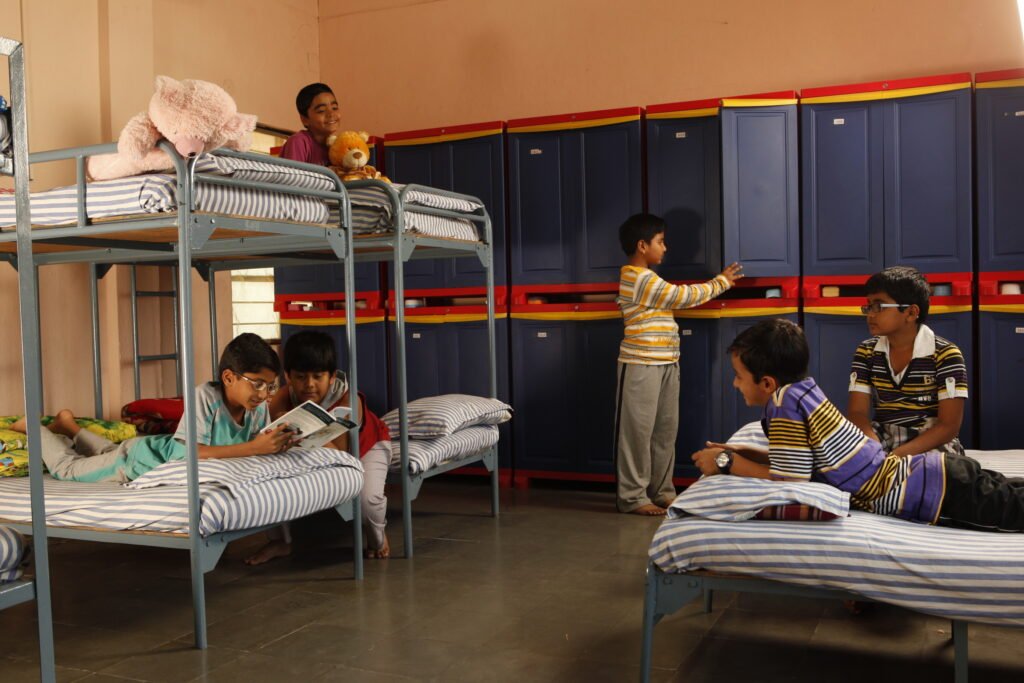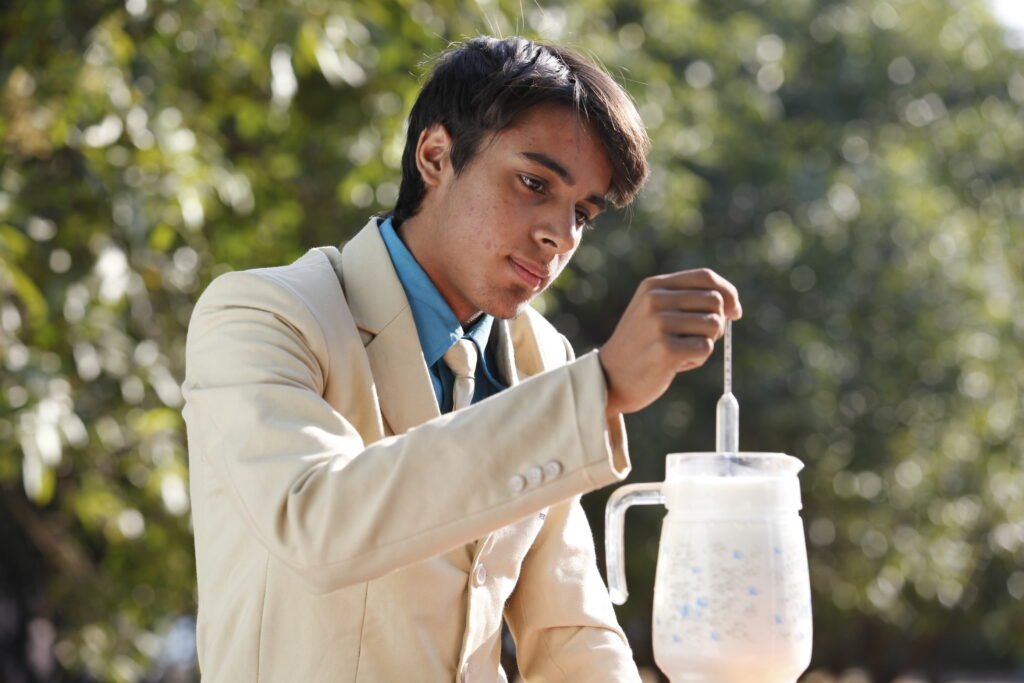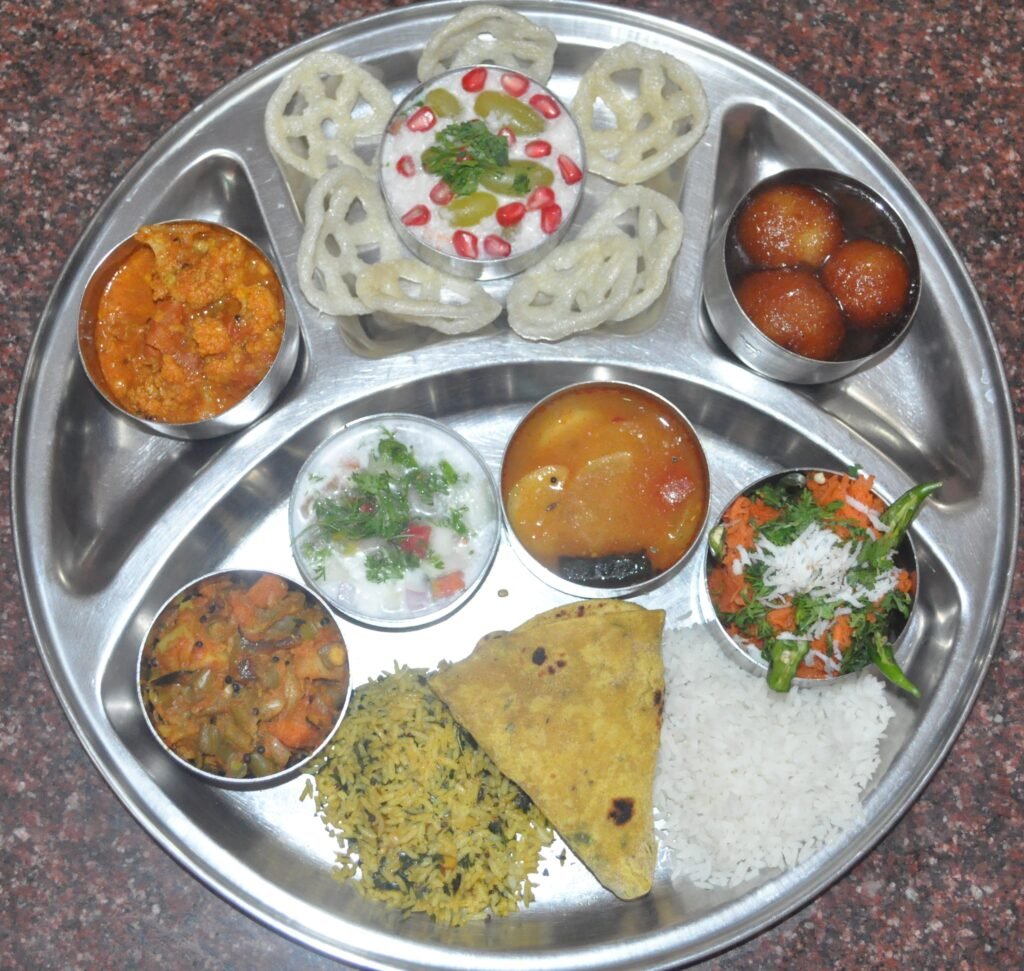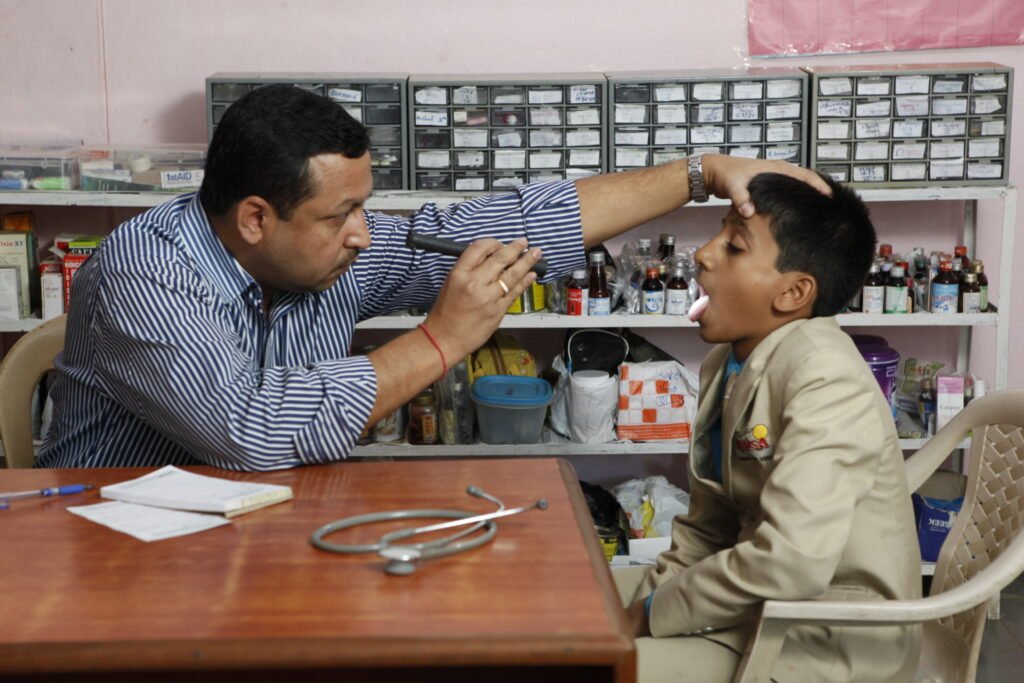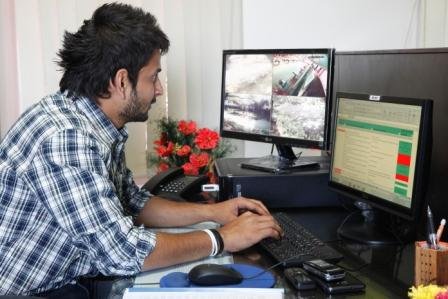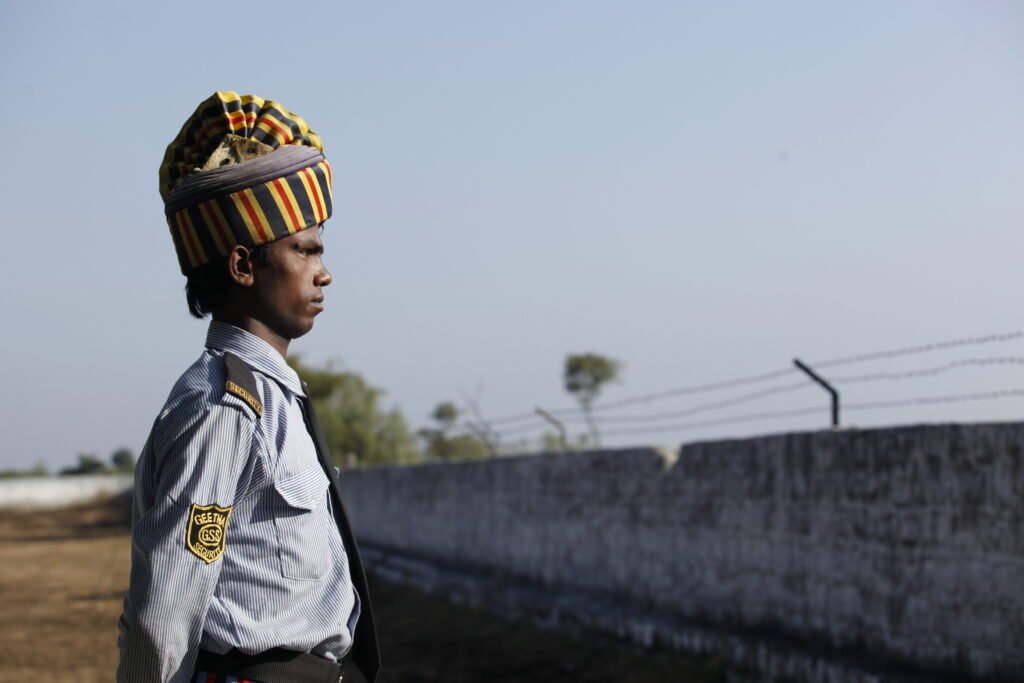Student Life
Daily Schedule
In their anxiety to reach the top, most people endeavour to develop their ‘brains and bodies’, forgetting the fact that a ‘whole person’ – which includes feelings, emotions, competencies, attitudes and spirit. Essential human competencies such as self-confidence, self-reliance, self-restraint along with appropriateness of emotion, have a large bearing on the success of an individual. Behavioural scientists advocate that individuals can achieve complete emotional balance only through ‘community living’ – during the growth years. Very often, innocent expression of parental love beyond a certain age, keeps children trapped in a ‘childish dependency’ – making them naive and helplessly in love with themselves! When ties are cut from both parents at an appropriate age and the child learns to grow independently in a community, a transformation occurs! Children learn that: ‘they will receive as much as they give’ and realize that Freedom and Responsibility are two sides of the same coin! This evolution will make their future roles in careers and societies mature, fulfilling and successful.
| Class IV & V | |
|---|---|
| Time | Activity |
| 5.30 AM | Wake Up |
| 5.30 AM – 5.45 AM | Brush & Wash |
| 5:45: Am – 7.00 AM | Games |
| 7.00 AM – 7.45 AM | Bath |
| 7.45 AM – 8.15 AM | Breakfast |
| 8.15 AM – 8.30 AM | Inspection March Past |
| 8.30 AM – 9.00 AM | Assembly |
| 9.00 AM – 9.50 AM | 1st Period |
| 9. 50 AM – 10.40 AM | 2nd Period |
| 10.40 AM – 11.00 AM | Milk Break |
| 11.00 AM – 11.50 AM | 3rd Period |
| 11.50 AM – 12.40 PM | 4th Period |
| 12.40 PM – 1.30 PM | 5th Period |
| 1.30 PM – 2.20 PM | Lunch |
| 2.20 PM – 3.10 PM | 6th Period |
| 3.10 PM – 4.00 PM | 7th Period |
| 4.00 PM – 4.45 PM | Activity Period |
| 4.45 PM – 5.45 PM | Yoga |
| 5.45 PM – 6.00 PM | Snacks |
| 6.00 PM – 6.30 PM | Wash / Tuck Shop |
| 6.30 PM – 7.00 PM | Prayer & Meditation |
| 7.00 PM – 8.00 PM | Preparatory Classes |
| 8.00 PM – 8.30 PM | Fun Games Story Time |
| 8.30 PM – 9.00 PM | Dinner |
| 8.00 PM – 9.00 PM | Telephone Calls (Twice a week) |
| 9:15 PM | Prayer & Lights Off |
| Class VI to VIII | |
|---|---|
| Time | Activity |
| 5.30 AM | Wake Up |
| 5.30 AM – 5.45 AM | Brush & Wash |
| 5:45: Am – 7.00 AM | Games |
| 7.00 AM – 7.45 AM | Bath |
| 7.45 AM – 8.15 AM | Breakfast |
| 8.15 AM – 8.30 AM | Inspection March Past |
| 8.30 AM – 9.00 AM | Assembly |
| 9.00 AM – 9.50 AM | 1st Period |
| 9. 50 AM – 10.40 AM | 2nd Period |
| 10.40 AM – 11.00 AM | Milk Break |
| 11.00 AM – 11.50 AM | 3rd Period |
| 11.50 AM – 12.40 PM | 4th Period |
| 12.40 PM – 1.30 PM | 5th Period |
| 1.30 PM – 2.20 PM | Lunch |
| 2.20 PM – 3.10 PM | 6th Period |
| 3.10 PM – 4.00 PM | 7th Period |
| 4.00 PM – 4.45 PM | Activity Period |
| 4.45 PM – 5.45 PM | Yoga |
| 5.45 PM – 6.00 PM | Snacks |
| 6.00 PM – 6.30 PM | Wash / Tuck Shop |
| 6.30 PM – 7.00 PM | Prayer & Meditation |
| 7.00 PM – 8.30 PM | Preparatory Classes |
| 8.30 PM – 9.00 PM | Dinner |
| 9.00 PM – 9.45 PM | TV Time |
| 8.30 PM – 9.45 PM | Telephone Calls (Twice a week) |
| 10:00 PM | Prayer & Lights Off |
| Class IX - XII | |
|---|---|
| Time | Activity |
| 5.30 AM | Wake Up |
| 5.30 AM – 5.45 AM | Brush & Wash |
| 5:45: AM – 6.30 AM | Yoga |
| 6.30 AM – 7.10 AM | Bath |
| 7.10 AM – 7.40 AM | Breakfast |
| 7.40 AM – 8.25 AM | Coaching for Competitive Exams |
| 8.30 AM – 9.00 AM | Assembly |
| 9. 00 AM – 9.50 AM | 1st Period |
| 9. 50 AM – 10.40 AM | 2nd Period |
| 10.40 AM – 11.00 AM | Milk Break |
| 11.00 AM – 11.50 AM | 3rd Period |
| 11.50 AM – 12.40 PM | 4th Period |
| 12.40 PM – 1.30 PM | 5th Period |
| 1.30 PM – 2.20 PM | 6th Period |
| 2.20 PM – 3.10 PM | Lunch |
| 3.10 PM – 4.00 PM | 7th Period |
| 4.00 PM – 4.45 PM | Activity Period |
| 4.45 PM – 5.45 PM | Games |
| 5.45 PM – 600 PM | Snacks |
| 6.00 PM – 6.30 PM | Wash / Tuck Shop |
| 6.30 PM – 7.00 PM | Prayer & Meditation |
| 7.00 PM – 9.00 PM | Preparatory Classes |
| 9.00 PM – 9.30 PM | Dinner |
| 9.30 PM – 10.00 PM | TV Time |
| 9.00 PM – 10.00 PM | Telephone Calls (Twice a week) |
| 10:15 PM | Prayer & Lights Off |
Dormitories and Dining
Balancing Independence with Inter – Dependence:
“As children grow up to be worldly inquisitive and indulgent, it is necessary to lay the foundation of discrimination, rather than a dominating the makes them revolt! Later self discipline naturally follows discrimination,”…..
Sage Vasishta counseled King Dasharatha –
(as narrated by Valmiki in the ‘Ramayana’)
Collective Living
Bracing Attitudes from ‘Me’ to ‘We’
In their anxiety to reach the top, most people Endeavour to develop their brains and bodies, forgetting the fact that a ‘whole person’ always includes feeling, emotions, competencies, attitudes and spirit. Essential human competencies such as self-confidence, self-reliance, self-restraint along with appropriateness of emotion have a large bearing on the success of an individual. Behavioral scientists advocate that individuals can achieve complete emotional balance only through ‘community living’ – during the growing year. Very often, innocent expression of parental love beyond a certain age, keeps children trapped in a ‘childish dependency’ – making them naive and helpless and in love with themselves! When ties are cut from both parents at an appropriate age and the child learns to grow independently in a community; a transformation occurs! Children learn that: ‘They will receive as much as they give and realize that Freedom and Responsibility are two sides of the same coin! This evolution will make their future roles in career and society more mature, fulfilling and successful.
The Abhyasa environment facilitates community living by simulating the larger society with students from all over India and abroad. The school is a replica of the larger world where individuals from different social and cultural backgrounds learn to live and work together until they reach a new level of consciousness.
Hostel Facilities
Abhyasa Provides comfortable hostel accommodation with spacious dormitories, individual cots and cupboards, round-the-clock hot water facility, assistance by ayahs (nannies), laundry, hair saloon, a tuck shop with toiletry, confectionery and stationary items, a tailor assistance.
Diet
Abhyasa provides well-balanced and nutritious vegetarian food for the students under the guidance of a dietician. Daily diet consists of wheat & ragi porridge, Milk (four times a day), protein cereals, seed sprouts, fresh greens, vegetable salads & fruits apart from a variety of rice, chapathi, snack and sweet items which cater to various regional tastes. Egg and Banana are served every day during the 11am break. Teachers dine along with the students and personally look into each student’s diet habits. Teachers and students serve food by rotation so as to create a family environment on the school campus.
Students’ Mess Committee
The Committee prepares the weekly menu and ensures that children get ‘what they like’. They also strictly monitor and control wastage of food. Teachers and older students serve food by rotation, dine together with the younger children and even feed the younger children whenever necessary-thereby creating the ambience of a single ‘close knit family’. Teachers & Masters who dine along with the students personally look into each student’s diet habits. Students of the Mess committee monitor the quality of milk, vegetables and groceries supplied to the school mess every day. Lacto-meters are used to detect adulteration of milk and all the food items are tasted by a panel of teachers and students before it is served to the rest of the school.| MENU | |
|---|---|
| Morning | Evening |
| Breakfast (7 AM) Sprouts and Milk with any Two of the following items: | Snacks (5 PM) Milk with any One of the following items: |
| Idly with chutney & Sambar | Savouries such as Mixture, Muruku etc. |
| Vada or Mysore Bajji with Sambar | Boiled Chole or Ground Nuts |
| Bread with Jam & Chutney | Maggie Noodles or American Chopsuey |
| Fried or Boiled Egg | Bhelpuri with Chutney or Puffed Rice Mixture |
| Vermicelli Upma or Pulihora | Poha Upma |
| Chapathi with curry | Palak or Onion Pakoda |
| Bansi Rawa or Bombay Rawa Upma | Bun with Chutney |
| Pav Bhaji or South Indian Rice Pongal | Sabudana Vada & Curd |
| Sabudana Khichdi or Green Gram Dal – Rice Khichdi | Masala Wada or Alu Bonda or Mirchi Bajji |
| Pesarattu or Uttappam or Dosa with Sambar & Chutney | Panipuri |
| Vegetable & Egg Noodles | Vegetable Burgers or Vegetable Puffs |
| Puri with Curry or Chole – Batura | Alu Samosa or Kachori |
| Macaroni pasta or Com Flakes with Milk | Pav Baji or Vegetable Cutlet |
| Lunch (1 PM – 2PM) | Dinner (8 PM – 9 PM) |
| Vegetable Salad | Rasam or Soup |
| Fried Rice with Masala Curry | Vegetable Curry |
| Vegetable Curry | Freshly Ground Chutney |
| Dal or Sambhar | Tur Dal |
| Plain Rice and Chapathi | Plain Rice & Chapathi |
| Curd or Butter Milk | Curd Rice |
| Papad or Fryums | Dessert, Fruits (alternative days) |
Health and Safety
Infirmary
An in-house Sick Dorm is available for all students to ensure that their medical needs are attended on a 24/7 basis. A stationed, qualified and trained nurse is available to look after medical issues of students. An ambulance is always available at a call. The infirmary is ready with all the necessary basic equipment to attend any type of emergency.
Health Report
Record of the sickness of each student is maintained by the school and updated on a weekly basis on the Anusandhan Module on school website http://www.abhyasaschool.com. Detailed information about: illnesses, their diagnosis, medicines administered to the child during an illness are made available to the parents who can constantly monitor the ‘Health Status’ of their child. Parents also receive intimations through SMS in case of any serious illness and the school nursing assistant would be available for discussion on phone. There is a hospital with scanning and operation facilities, adjacent to the school campus and the doctor is available round the clock for any emergency. Toopran town also has a facility of 108 ambulance service. In case of a serious illness the child will be shifted to a competent hospital at Hyderabad and parents will be duly informed of the admission. Expenditure incurred on such hospitalization will be borne by parents/guardians.Periodic Health checkup
Monthly health check-ups are under taken for each and every student to make sure that the students grow taller, stronger and sharper. Height and weight check-ups are done regularly and the data is also available to parents. The data recorded is cross verified with the earlier readings to look for variations. If any weight loss is noticed in a child, a special care is taken by providing proper diet under the supervision of matrons. In case of seasonal contagious diseases, regular homeopathy medicines are administered as a precautionary measure for all inmates on campus. Periodic Orientation Camps for students are conducted by specialists such as Dentist, Orthopaedist, Psychiatrist, Gynaecologist etc.
Daily Hygiene Monitor
Every matron is provided with a check list to ensure that every student undertakes his/her daily chores such as brushing teeth, cutting nails, cleaning ears. All bed linen is changed weekly. Vaseline is provided to students to ensure that their skin does not dry up. All Dormitories have a safety insect net for all doors and windows and all the rooms are sanitized on a daily basis with the fumes from burning of dry Neem leaves. This also prevents the spreading of communicable diseases.
First Aid
Training in basic emergency medical aid is provided to all the students at the beginning of every academic year. Students learn how to use the first-aid kit. They also learn about the basic types of medicines and techniques that are necessary to provide emergency help in case of eventualities such as accidents, hurt, falls, burns, breathlessness etc.
Fire Safety
Every inmate of the campus is trained in Mock Fire Drills thrice a year to ensure that every student is trained to face an eventuality of a fire accident. Students learn the skills of using fire extinguishers placed in all vital locations namely classrooms, dorms, dining hall, laboratories etc.

Safety & Security
The safety and security of the children and school campus is outsourced to Professional Security Agencies. Constant vigil is maintained round the clock at all vital locations around the campus to ensure that children are safe and secure at all times. The school also maintains a list of visitors authorized by the parent to visit their child on the school campus. Unauthorized visitors are not allowed to meet any child. Every call to and from the child is verified before the child attends to it to ensure that students are communicating only with their parents and guardians. Attendance of all students is taken by every subject teacher before commencing a class and all dinning sessions are monitored to ensure that every student is present. Special security check is conducted before the students retire for the day to ensure that everyone is secure inside the Dormitories. A lady security guard is also available for girls. Though the security screens all class IV employees, all the students are personally responsible for the safety of their belongings.
CCTV
The CCTV is a Live Centrally Monitored Surveillance system which watches the movement of Staff and Students at the critical locations of the large school campus, on a round-the-clock basis. This ensures a peaceful co-existence of inmates on the campus and also checks unwanted straying into prohibited areas. A Close watch is also kept on the movements of senior boys and girls and the system also prohibits the entry of unauthorized persons into the campus. The disciplinary issues or any other misbehavior could also be tracked. Abhyasa makes use of the latest technology to address the issues of Safety, so that the pupils on the campus could be safe and lead a hassle-free life-which is essential for the overall development of the Child.
Clubs and Organisations

Prefectural Leadership
Abhyasa provides a unique opportunity wherein 10% of students in the school – selected from across all classes, get an opportunity every year to don leadership roles in the capacity of Managers, Class Leaders, Dormitory leaders, Academic coordinators, House Captains, Prefects, Head Boy, Head Girl and School Captain. It is an excellent opportunity for students to experience leadership and responsibility while at school.
Shiva, Shakti & Saarva Houses
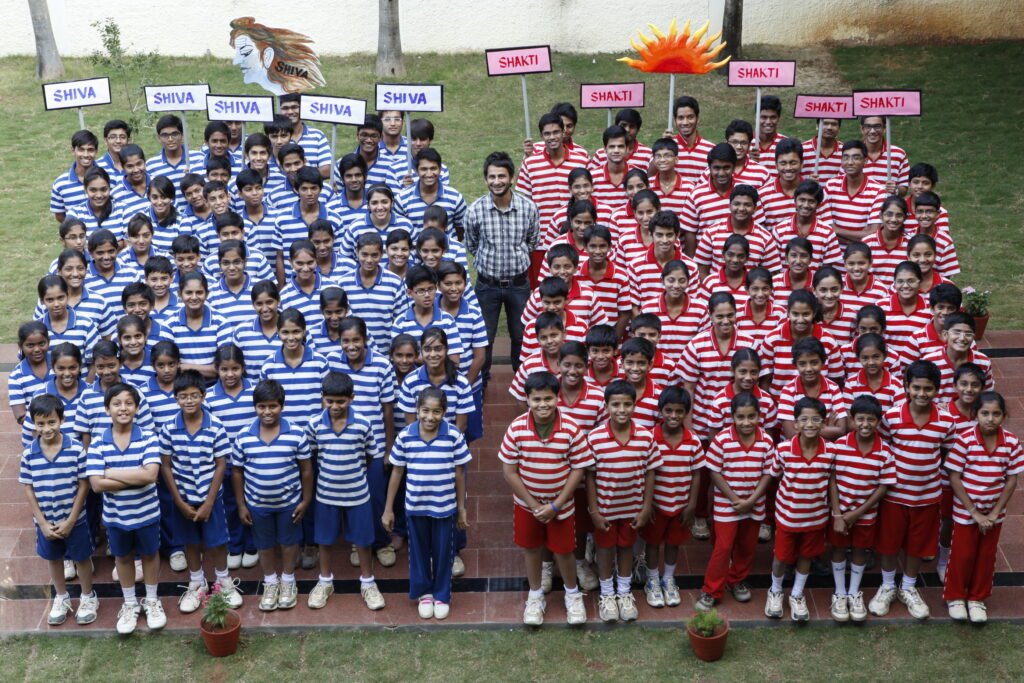
To develop a healthy competitive spirit among children, each student is assigned to a ‘House’ – to which he/she belongs and represents in all competitions on the school campus. The school is divided into three houses namely Shiva (Blue Color), Shakti (Red Color) & Saarva (Yellow Color)– symbolizing the Masculine and the Feminine aspects of Nature. The house captains mobilize boys and girls at the junior (Grades IV, V & VI) – Intermediate (Grades VII & VIII) – Senior levels (Grades IX & XI) to participate and compete in various Inter-House Games and Cultural activities.
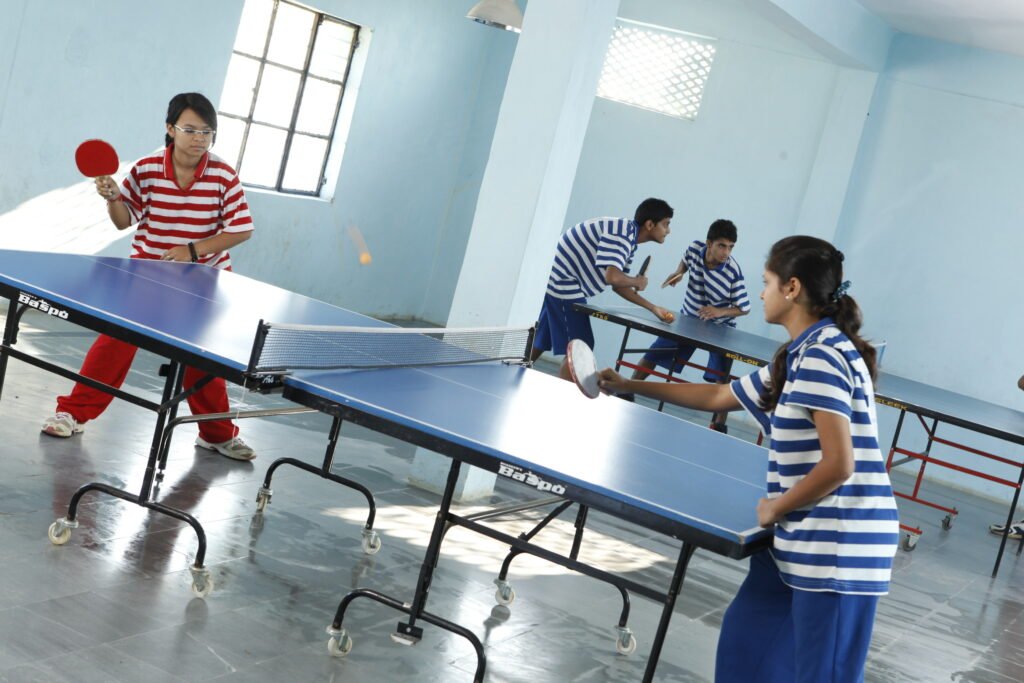
Inter House Games and Sports
Competitions are conducted in all Games and Sports events throughout the year – to spot talent and train students for external Inter-School competitions. An annual time table is drawn up for exhibition matches at every weekend and the sports, field and track event competition are held during the months of September – October, culminating in a Inter-House Sports Festival on the last day of the First semester. These programmes are planned in consultation with the student leaders and State and National level event records are monitored to meet targets.
Student Club Activities
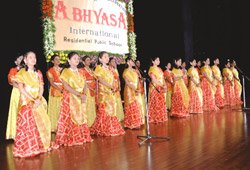 These activities are Inter-house Competitions conducted by the School in various events such as Dance, Music, Fashion Show, Quiz, Debate, Elocution, Science Projects, Poetry, Dramatics, Antakshri, Fun Games like ‘what’s the good word?’, Dumb charades etc between the Shiva and Shakti Houses at the three levels of Juniors, Intermediates and Seniors. All preparations for performances are undertaken completely by the students without any inputs from their teachers. This brings out their innate talents and creativity and also helps to shed inhibitions in the child. This training imbues organizational and managerial skills in children and inculcates collective responsibility. Such competitions are held every Sunday and the points scored by each house are added to the overall tally of the House Points.
These activities are Inter-house Competitions conducted by the School in various events such as Dance, Music, Fashion Show, Quiz, Debate, Elocution, Science Projects, Poetry, Dramatics, Antakshri, Fun Games like ‘what’s the good word?’, Dumb charades etc between the Shiva and Shakti Houses at the three levels of Juniors, Intermediates and Seniors. All preparations for performances are undertaken completely by the students without any inputs from their teachers. This brings out their innate talents and creativity and also helps to shed inhibitions in the child. This training imbues organizational and managerial skills in children and inculcates collective responsibility. Such competitions are held every Sunday and the points scored by each house are added to the overall tally of the House Points.
Student Management Committees

At Abhyasa, the students manage various departments of the school through Committees headed by a Student Manager, Deputy Manager and Voluntary Members drawn from classes VIII to XII. Students set annual goals for each of their respective departments at the beginning of the academic year and lay down a set of rules and regulations to manage the departments. The various Management Committees include:
- Academic Management (Monitors Teaching – Learning process)
- Campus Management (Monitors Campus Environment and Hygiene)
- Discipline Management (Monitors Student Behavior and conflicts)
- Extra Curricular Activities and Event Management (Entertainment)
- Games and Sports Management (Plans Competitive Strategies)
- Rural Service Management (Interacts with the lesser privileged)
- Spirituality Management (Organizes Spiritual enhancement events)
- Mess Management (Monitors menu, quality and waste prevention)
Rotary International’s Student Interact Club

Interact Club of Rotary International is a Services Club for youth between age 14 to 18 years. Interact club is a self-governing and self-supporting body dedicated to Community and International services. The name ‘Interact’ is a combination of the words ‘International’ and ‘Action’. The Interact Club at Abhyasa was formed on 20th September, 2008 (Club ID – 15570 under District 3150 of Rotary Club Hyderabad North) with 99 founding members & networked with Interact’s Global Youth Network
Ambassadors of the Environment
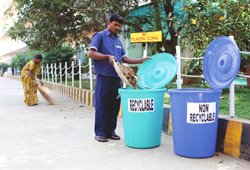
Abhyasa National Green Corps Eco-club has Green Soldiers from class VII onwards. The club has taken up water conservation awareness through skits, puppet shows, debates, quiz etc. and recycling of water and newspapers. The Andhra Pradesh NGC team identified and recognized Abhyasa’s Eco-club activities and aired our success story on All India Radio – New Delhi. Our little soldiers are making Abhyasa campus a ‘Zero-Waste Campus’ and a ‘No-Plastic Zone’ by segregating and recycling waste. Students are safeguarding a 100 year old Banyan Tree on the campus and planning to revive a dying river on the outskirts of Toopran.
The following activities are highlights of the club:
- Bio-Diversity
- Water Management
- Waste Management
- Energy Management
- Land-use Management
Sports & Recreation
“All work and No play-makes Jack a dull boy” – so goes the adage. Recreation is one of the Seven Essential Needs for Human Survival, which many corporate schools and colleges ignore these days. When an institution does not care to organize entertainment activities for its students, they in turn discover un-wanted and un-healthy means of keeping themselves in good humor. Even in Several homes in the metros today, children are addicted to passive entertainment from Television and Internet, making them nothing more than couch potatoes.
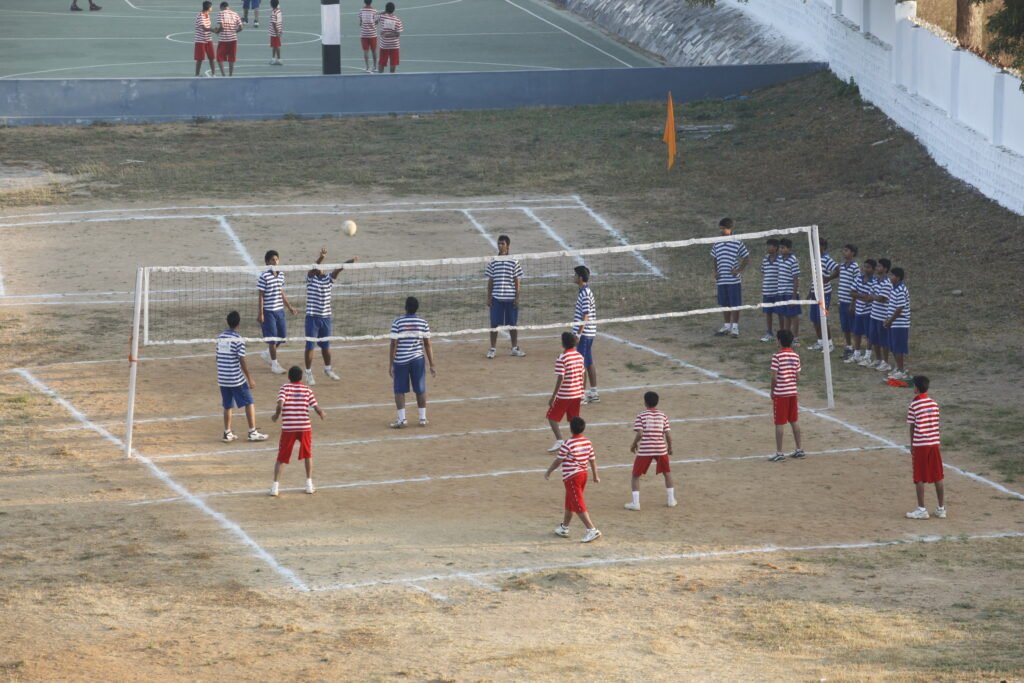

Active Entertainment
Abhyasa believes that only when a child actively participates in the entertainment, he/she is happy, healthy, confidant and creative too! The school organizes Sunday picnics and Trekking Camps, apart from Saturday evening Campfire dances and Candle light dinners during the weekends. Students and staff alike set aside their inhibitions of age and status and spontaneously join in the bonhomie, for we at Abhyasa believe that freedom of expression is a part of Personality Development. Only individuals, who have attained inner freedom to express themselves openly, develop the capability of transforming their Society!
Live Radio on Campus
Each day on the campus starts with soothing melodies aired on the Live Campus Radio – ‘Abhyasa Vani’ It begins as early as 5.45 in the morning with ‘Bhakti Sagar’ programme (devotional songs), followed by popular film music during the breaks and dining sessions every day. Interviews are conducted by the student R.Js (Radio Jockeys) of students / staff on their birthdays and of any guests visiting the campus. The system is also used for important announcements for all the staff and students.


Sunday Specialization Classes
Abhyasa recognizes the innate potential of the students from classes IV to IX and has set aside a good three and half hours every Sunday for getting them trained in the vocations identified by the school to develop student skills and aptitudes. Activities, namely Basket Ball, Cricket, Swimming, Athletics, Badminton, Art, Dance, Literature, Music – Vocal & Instrumental, Martial Arts, School Band, Gymnastics, and photography are offered at Abhyasa. Students of classes X and XII spend time in enhancing their skills for facing All-India level Competitive Examinations for entry into various professional courses. The school also facilitates bringing in specialists in various skills/academic subjects to coach the students on Sundays.
Sunday Evening Cinema
Award-winning Hollywood and Bollywood films are screened for all the students in the school Amphitheater. The screening is usually followed by a value-discussion on the film content with the School Director, over a cup of hot coffee. The sessions are therefore not only entertaining, but also enriching.

Moon Light Walks
The cool breeze, the starry sky and a full moon is a perfect setting for long late evening walks after dinner. Small groups of accompanied by their teachers stroll out of the campus into the meadows and the wilderness around. The peace, tranquility and the nostalgia of the moments form an inexplicable experience at Abhyasa.


TV Time
One precious hour at the end of the day for any child is the TV viewing hour, wherein the students can update themselves with happenings around the world by watching the news, or enjoy the fun of a cartoon network show. Cricket matches and other sports events are the most popular among students.
Self Reliance
Self-reliance activities are aimed at promoting ‘Dignity of Labor’ among children. Students are trained to maintain cleanliness of Dormitories, Classrooms and the Campus. They maintain vegetable gardens and help in the kitchen by rolling out chapattis/puris, peeling/sutting vegetables and also setup audio-visual systems for school events. They gain insights into different Work Areas of Life, Self-Help and Survival Skills.


Monthly Parent Visit (Sunday Afternoon)
On Sundays earmarked in the school almanac, the parents of students are invited to visit their child on the campus. Such visits are generally held between 1.00 PM & 5.00 PM and parents are permitted to bring Home Lunch for their child/ward on the campus on the condition that No plastic or garbage is left behind on the Campus. The parents could also interact with the members of the School Administrative Team on any issues pertaining to the child. During these visits parents are also permitted to scrutinize the student’s academic work and other projects undertaken by their child/ward.
Festivals & Celebrations
Rural Service Programme
Aims to sensitize the students to the economic and social realities of Indians and share their resources with the less privileged and disadvantaged. Inculcates social responsibility, empathy and service mindedness among the students.
Arpan: The rural service programme of Abhyasa aims to sensitize the students to the economic and social realities of Indians and share their resources with the less privileged and disadvantaged, inculcates social responsibility, empathy and service-mindedness among the students. The students have adopted the 300-household Harijanwada at Toopran village and aim to develop this hamlet into a model village, by the year 2020. Regular health checkup camps, sharing of educational technologies, de-addiction counseling programmes are conducted by the students at the village.
Bi-Annual Medical Camps for the Poor:
The camps are conducted in the months of July and in Nov with an idea to serve the Medical needs of the people in and around Toopran. On an average in every camp at about 800 patients are diagnosed and medicines are distributed freely. Many Doctor Parents also contribute to the success of these Medical camps.

Adult Literacy:
The Abhyasa Gram Seva Student Management Group spend their free time and the Sundays with the people of Harijanwada in Toopran motivating the School drop outs to go back to Schools and educating the illiterate.
Computer Literacy for Un-Employed Youth:
The un-employed youth in the village of Toopran get an opportunity to develop Computing skills through this programme, where Abhyasa students along with an external faculty teach Computer basics and programming.
De-addiction and Family Counselling:
The Students of Gram Seva Management go house to house in Harijanwada, talking to people about the ill-effects of different addictions such as smoking, chewing tobacco etc. Some movies were also shown on Health and Hygiene. AIDS Awareness programmes are also being organized by students.
National Rural Employment Guarantee Scheme:
Under this scheme Abhyasa is planning to acquire some govt. land to take up Commercial Plantation to provide livelihood to a few families in the village of Toopran.
Narayana Seva:
Under Narayan Seva, we at Abhyasa distribute food to the needy in the village. This is performed on all the festive occasions where the Students go to the village and distribute food to all at Harijanwada.
